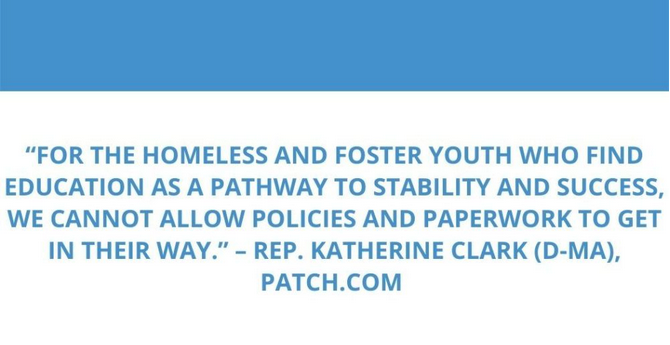Access to Higher Education: Supports for Homeless and Foster Youth
By Rachelle Robins, Reprinted from the American Youth Policy Forum
Young people experiencing homelessness and those in the child welfare system face unique challenges when it comes to education, including post-secondary education. The National Working Group on Foster Care and Education found that over 70 percent of foster youth want to obtain a college degree, but only half of those students actually enroll. Moreover, only three to ten percent of youth in foster care eventually obtain a bachelor’s degree.
The Need
iFoster recently conducted a survey of 2,411 participants, consisting of current and former foster youth, caregivers, and workers. Their report, based on that survey data, identified a “great need for tangible services, like rental assistance, employment, and money for daily expenses” that can aid young people in achieving individual goals like completing a college degree.
Similar challenges are seen among the homeless youth population. Additionally, 14% of students in higher education report experiencing homelessness, which indicates that these students live with food, shelter, and resource insecurities.
According to Chapin Hall at the University of Chicago, youth in the foster care system and those experiencing homelessness–who are either seeking to enroll in college or persist to graduation–face numerous hurdles:
- Insufficient preparation for college coursework
- Minimal professional guidance
- Few resources targeting their unique needs
- Soaring cost of higher education
- Limited financial resources and understanding of financial aid.
Possible Solutions
The Higher Education Access and Success for Homeless and Foster Youth Act (HEASHFY) as well as the Fostering Success in Higher Education Act (FSHE) were two higher education bills introduced in the 117th Congress to address some of these challenges.
HEASHFY would:
- Prioritize students experiencing homelessness and those in the foster care system for campus housing
- Require colleges to designate personnel dedicated to connecting these young people with student support services and community resources
- Make these students eligible for in-state tuition, especially when they have not had stable residency
- And more.
The bill is sponsored by Sen. Murray (D-WA) and Sen. Portman (R-OH) in the Senate and Rep. Clark (D-MA), Rep. Young (R-AK), and Rep. Bass (D-CA) in the House. Sponsors believe that these “common-sense” changes can provide “clear and reliable pathways” to help foster and homeless youth populations to succeed in college and achieve their full potential as leaders.
In addition to other reforms, FSHE would “[i]nvest $150 million a year in states, tribes, & territories to establish or expand statewide initiatives to assist foster and homeless youth in enrolling in and graduating from institutions of higher education.”
It is sponsored by Senators Casey (D-PA), Brown (D-OH), Smith (D-MN), Klobuchar (D-MN), and Stabenow (D-MI). The House sponsors include Rep. Davis (D-IL), Rep (Krishnamoorthi (D-IL), and Rep. Bass (D-CA).
The bill was also introduced with the intention of improving “college access, retention and completion rates for foster and homeless youth…[by] substantially improv[ing] state capacity to support these students as they transition to and attend college.”
Numerous organizations have expressed support for the bills and the need to make higher education more affordable and attainable for underserved youth. According to SchoolHouse Connection, a national non-profit organization that works to “overcome homelessness through education,” these bills will “help homeless and foster youth transition successfully to and through higher education, and receive the support they need to complete their degrees and achieve economic independence.”
AYPF’s Perspective
AYPF is dedicated to helping create positive, affirming, and equitable educational environments for all students, not only in K-12 schools, but also in higher education. For young people experiencing homelessness or youth in the child welfare system to have meaningful access and opportunity to succeed in college, we must provide additional resources and remove barriers that are targeted to their specific circumstances. AYPF applauds federal policymakers in their efforts to address these issues and advance policy reforms that improve the lives and outcomes of youth who have been marginalized by systemic inequities.
Watch Video: “Foster Youth and Community College”
To access the resource, please click here.
















